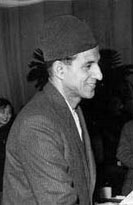Jail Journal
Jail Diary of BP Koirala
Explanatory notes in parenthesis are given to help readers locate the characters in BP Koirala's personal and political life - Editor.February 14, 1968:
TP and Rosa saw me on the usual round of monthly interview. Girija also saw me, but alone; even the army officers kept themselves away from the interview. They, however, kept us under observation by watching us from a distance. GP has said that he was working in agreement with Tarini Prasad for our release, which according to him, depended upon reconciliation between the King and us. There is also compulsion of events that should lead to some understanding between us, he said. He felt that the King was also interested in the outcome of their efforts. As a matter of fact SP (Surya Prasad Upadhyay) has some kind of tacit support of the King. I expressed my doubt about the King's intention. I told GP that if the King really wanted reconciliation he could have released us without much ado. GP was with me for over an hour.
- SP has got himself into this business on GP's instigation. It began a few months ago when SP was lodged in the same jail with GP.
- When GP was assured by the PM and the commissioner that he would be released immediately after he broke his fast, he thought that it would help SP if he accepted the assurance of SP rather than the PM to break his fast.
- SP has joined the Kisan organization on the King's suggestion that SP must show by action that he was not against the monarchy. We would respond to his suggestion that the King should on his part show by act that he too was interested in democratic development of Nepal's politics. The chain of reciprocal relations must begin from SP, etc. and hence SP joined the Kisan organization.
- The King is prepared to amend the constitution to suit our requirements (King doing away with the tier system of election for the national Panchayat etc.).
- The King says that he is under no pressure from outside. India is particularly in dread of him; hence she cannot even suggest anything to him. US have also lately given up putting pressure on him. China's pressure too is such that he can stand up to it. The King perhaps wants to convey to me that if he brings about a change in Nepal it would be by his own volition and act, that is, the change will be again a royal gift.
- Communists are fast growing in the country and are entrenched even in Government departments. The King is aware of it.
- My reputation is at the highest point at present.
- Subarna is frustrated as also our workers who are in exile in India.
- Subarna (Subarna Shamsher) is isolated, because our workers feel that he has not succeeded in giving a lead to them.
- If the situation remains as it is the Communists will take over the country within five or six years.
- China's influence is fast growing.
- Morarji Desai has written to Koshu (Keshav Prasad Koirala, brother of BP Koirala) that he should try to work with the King and that India could not be of help to him (us).
- There is likelihood that we would be released in two batches - KP, Divan (Divan Singh Rai) and Sherchand (Yogendra Man Sherchand); GM and myself in the second. If things develop according to GP's effort of reconciliation, we would be released in course of four to five months.

